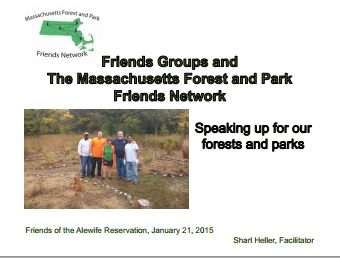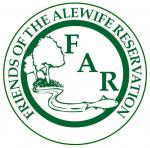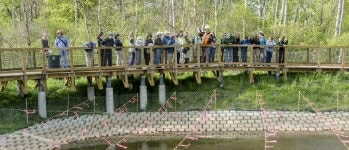Deepest gratitude goes to the US-EPA and town of Belmont upstream from Little River for recently enforcing the Clean Water Act (CWA) enacted over President Reagan's veto in 1972, but presently under threat from national, state and local refusal to mitigate the Upper Mystic Basin tributaries in Cambridge, Belmont, Arlington and Somerville flowing to Medford and into the Mystic River and our Boston Harbor/ocean. According to the EPA, May 30th press release from the New England Regional office, Belmont engineers and Water Department officials, with support from the newly formed Belmont Storm Water Committee, are addressing "stormwater discharges of pollutants from cracked and leaking sewers moving into the storm drain system, and discharging into Winn’s Brook, Wellington Brook, and the Little River", located in Belmont and Cambridge.
The national CWA threat from President Trump's rollback of the recent Rule, "Waters of the United States Rule of 2015" was hailed by the Obama administration as"protecting the water supply for about 117 million Americans." The smaller water bodies or streams are the ones which also determine water quality to US Rivers.
With this agreement, "The Administrative Order on Consent, requires Belmont to submit an Illicit Discharge Detection and Elimination Plan (IDDEP), assess its sanitary sewer system, and remove all illicit discharges to the system within five years."
"This agreement is part of a larger effort by EPA New England, the Commonwealth of Massachusetts and communities to improve water quality within the Mystic River watershed. Each year, EPA New England – in collaboration with the Mystic River Watershed Association – issues a Water Quality Report Card. " During the 2015 calendar year, tributaries feeding the Mystic River in Belmont including Winn’s Brook, Little River, and Alewife Brook received grades ranging from “F“ to “D+” based on poor bacterial water quality."
Cambridge's one linear mile, Little River, received a D- in 2015. Another Variance delay was requested and received from Dept. of Environmental Protection (DEP). Testimony at Boston's DEP headquarters August 8, 2016 by Mystic River Watershed Association and Friends of Alewife Reservation requested to DEP as part of the Variance requirement, that MWRA and Cambridge develop a Long Term Control Plan (LTCP) which would commit to ending continuous contamination in the Little River sub-watershed.
The testing techniques used for the compliance were " forensic analyses of selected pharmaceutical compounds commonly found in sewage, to identify illicit discharges of sewage to the storm drain system. This effort has allowed EPA to inform communities of exactly where illicit discharges are occurring so they can be addressed as quickly as possible."
"As part of the Boston Harbor cleanup effort, EPA New England enforcement actions under the Clean Water Act have eliminated in excess of 37,000 gallons of sewage per day from discharging to storm drains in the Mystic River watershed, and have eliminated nearly 200,000 gallons per day of sewage discharging to the Boston Harbor watershed as a whole."
Mass Water Resources Authority (MWRA) with Cambridge must comply with the federal Boston Harbor cleanup court order demonstrating an 85 percent improvement (or reduction in pollution) in Little River by 2019 (8th Variance date) and in Alewife Brook. However, massive development plans moving rapidly forward in the Concord Ave quadrangle will generate increasing storm water run off into an already impaired water body of Little River and its stream tributaries, triggering more illicit harm from contamination and future surge/sea rise impacts. Thus, it is predicted by climate change agencies and organizations. Citizens might await an Environmental Impact Review (EIR) of the floodplain area if one has been completed and submitted to the state.
-Ellen Mass, President, Friends of Alewife Reservation
- Home
- Directions
- FAR Wildlife Blog
- Calendar
- News
- Donate Now
- Get Social!
- Storm Water Wetlands
- Plants and Restoration
- Photos
- Videos
- About & Projects
- Master Plan for Alewife
- Archive
- Newsletters
- Contact
 Presentation Spotlighting Alewife Reservation
Presentation Spotlighting Alewife Reservation
 Follow us on Twitter
Follow us on Twitter
 Like us on Facebook
Like us on Facebook
 Follow us on Instagram
Follow us on Instagram
Forward our web address to a friend!
- An Urban Gem - Alewife Reservation Nature Preserve
- Envisioning The Silver Maple Forest
- History and Policies of Cambridge, Belmont, and DEP
- Storm Water Wetlands
- Friends of Alewife Reservation brochure
(front, back) - Technical Analysis of Upper Alewife Basin
- Watershed: An Excursion in Four Parts
- The River Is A Restless Spirit: Life in the floodplain forest
-
Assessment of Silver Maple forest for DEP Adjudicatory hearings and
Patrick Fairbairn, author of the Assessment - Community Native Garden Flora
The
Alewife Reservation
is a unique natural resource for the communities of Belmont, Arlington and Cambridge
and home to hundreds of species, including hawks, coyotes beavers, snapping turtles, wild turkeys and muskrats,
the reservation is a unique natural resource for the community.
Historical information (Powerpoint)
Friends of Alewife Reservation works to protect and restore this wild area and the surrounding area for the water quality, native plants, animals and over 90 bird species with paths for walking, running and biking, recreation, and for classroom education and research. We regularly steward and preserve the Reservation area for wildlife and for the enjoyment of present and future generations.

(video)
By-Laws
About Friends of Alewife Reservation
Statement of Purpose
Citizen Forester newsletter archive
The Birds of the Cambridge Region of Massachusetts

by William Brewster 1906
Nuttal Ornithological Society
Biodiversity Study of Alewife Reservation Area: Species, Habitat, Ecosystems

Inventories by David Brown, wildlife assessor (2003, 2004.) Published by and available from FAR for $10. Write or call for your copy. (sample)
Updated Dave Brown Inventories (2008, 2010)
Inventories of Alewife Reservation Wetland Plants by Walter Kittredge, Botanist (2013)
Email: alewife@greencambridge.org
Join our mailing list
For technical problems with this website, email: webmaster@friendsofalewifereservation.org

